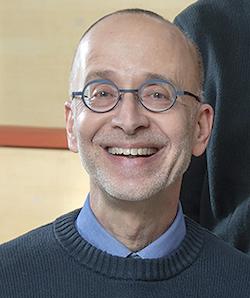The diligence and care with which Arthur Evenchik approaches all aspects of his work with local youth are inspiring. Whether he is showing undergraduate volunteers in Case Western Reserve’s Project STEP-UP how to tutor struggling readers, consulting on a program at the Cleveland School of Science and Medicine in which CWRU medical students help high school seniors with their college application essays, or serving as a mentor to undergraduates in CWRU’s Emerging Scholars Program (ESP), Evenchik is committed to serving urban youth and ensuring that they have the skills and support to succeed throughout their academic careers. In this month’s Staff Spotlight, Evenchik discusses his efforts as a representative of the university to improve the life chances of young people in our surrounding communities.
How did serving urban youth become a passion project for you?
I began teaching middle school students in the early 1980s through the Johns Hopkins Center for Talented Youth, which conducted summer programs for young people who were already high scorers on the SAT. Back then, unfortunately, CTY wasn’t recruiting many minority students from urban school districts. Much later, in the late 1990s, I learned about a volunteer opportunity at a school in Washington, D.C. called the Maya Angelou Public Charter School. This was a second-chance school; many of the students hadn’t been successful in the traditional D.C. high schools, and some had been involved in the criminal justice system. When I saw the supportive community the school had built for these students, I wanted to join the staff. But I kept thinking, 'Arthur, you don’t have the background for this. You’ve never worked in an urban setting.' Still, I loved tutoring at the school and building relationships with the students. Then, one evening, I was staying late to help a senior named Ivan with his college essay. Over the course of the evening, the essay just kept getting better and better. Afterward, I hopped on a commuter train to Baltimore, where I lived at the time, and I kept saying to myself: ‘You can do this, Arthur. You can do this.' Not long afterward, a position opened up for a volunteer coordinator, and I jumped at it. We had 300 tutors a week—mostly young professionals—coming to the school in the evenings to work with our students. It was one of the most rewarding professional experiences of my life. I stayed there for four years until I came here.
So, what was the position that brought you to Case Western Reserve?
It was a beautifully open-ended position: Assistant to the Dean for Special Projects. The dean at the time, Mark Turner, just said to me, “Go figure out where you can be useful.” So, I helped to start a peer tutoring program in writing, the SAGES Peer Writing Crew, and I became the founding editor of art/sci, the college’s alumni magazine. Finally, in 2011, Dean Cyrus Taylor invited me to work with Stephen Haynesworth to create the Emerging Scholars Program, whose mission was to serve CWRU students who had graduated from Cleveland-area high schools. This opportunity was very exciting to me. At the Maya Angelou School, we were helping high school students prepare for college. But we always knew there had to be people to catch them on the other side, to identify their needs and support them. With ESP, I get to be on the other side—to catch students when they cross that divide and ask them, “What do you need? What can we do so that you’ll be successful here?”
How did you become involved with Project STEP-UP?
Initially, my job at CWRU didn’t involve working directly with urban youth, but I was volunteering at the Cleveland School of the Arts. One day, 18 years ago, I ran into Janice Eatman Williams in a school hallway and became aware of Project STEP-UP. I mentioned to her that I had experience in literacy tutoring, and she invited me to participate in her orientation sessions for undergraduate volunteers. Janice is very much a welcome aboard sort of person. We’ve worked together ever since.
How do you prepare Case Western Reserve students to be successful tutors?
During orientation, we acknowledge that our students will be volunteering in schools where there are challenges of every kind in terms of providing students with a quality education. A tutor walking into that setting cannot pretend that he or she can fix everything. You can’t turn a struggling reader into a proficient reader overnight. Still, we tell the tutors: ‘You can make a difference. You may be the one person in the building who sits down one-on-one with a student, identifies gaps in their knowledge and tries to fill them. Maybe your student won’t improve as rapidly as you would hope. But you have to be willing to celebrate whatever advances you and the student make together. You owe it to the student not to become disheartened.’
The Emerging Scholars Program is near and dear to you. What are you most proud of with the program, and what opportunities do you see for it moving forward?
As far as moving forward, we have a generous grant from the Eric & Jane Nord Family Fund to convert our summer bridge session from a commuter program to a residential program starting in 2023. We think this change will strengthen our students’ sense of belonging and give them a truer impression of college life. My greatest source of pride in ESP is the success of our alumni. Every summer, we convene an alumni panel to speak to our entering students. We couldn't do that in the early years, because we had no alumni. Now that we do, they’re a godsend. They tell our entering students what it was like when they were starting out at CWRU, and they reflect on their entire college experience. Steve and I just sit there, in awe of these accomplished adults. It’s wonderful to see our alumni come into their own.


